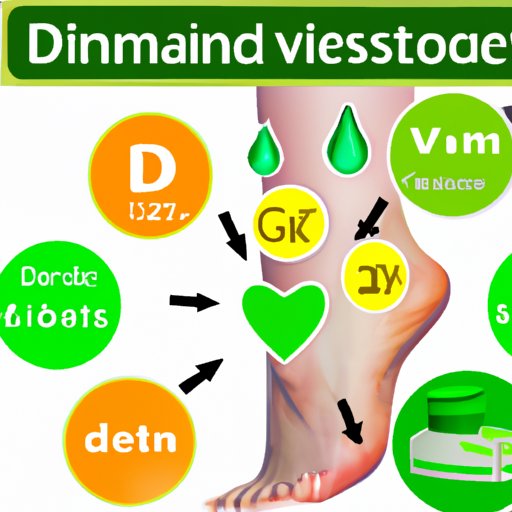
I. Introduction
Leg cramps are a common and painful problem that can disrupt even the most restful night’s sleep and hinder daily activities. They occur when a muscle contracts involuntarily and refuse to relax, leading to discomfort and inability to move. Leg cramps can be caused by numerous factors, including dehydration, muscle fatigue, and nutrient deficiencies. This article will explore the role of vitamins in preventing and alleviating leg cramps, and provide guidance on recommended daily intake and where to find these essential nutrients.
II. Say Goodbye to Leg Cramps with Vitamin D: How This Essential Nutrient Can Ease Your Pain
Vitamin D is an essential nutrient that has numerous roles in the body, including supporting immune function, maintaining bone health, and promoting muscle strength. Low levels of Vitamin D can contribute to leg cramps, as it plays a crucial role in the absorption of calcium, crucial for muscle function. Studies have shown that supplementing with Vitamin D can have a positive effect on muscle health, reducing the incidence of cramps and promoting quicker recovery following physical activity. Vitamin D can be found in foods such as salmon, tuna, and egg yolks, as well as through exposure to natural sunlight. The recommended daily intake of Vitamin D varies by age and sex, but most adults need at least 600-800 IU per day.
III. The Power of Magnesium: How This Mineral Can Alleviate Leg Cramps and Improve Your Health
Magnesium is a mineral that is essential for various body functions, including muscle and nerve function, maintenance of a healthy heartbeat, and blood sugar control. Low levels of Magnesium have been linked to an increased incidence of leg cramps, as the mineral plays a significant role in muscle relaxation. Supplementing with Magnesium can both prevent and alleviate muscle cramps, promoting overall physical health and well-being. Magnesium can be found in foods such as spinach, almonds, and avocado, and the recommended daily intake varies by age and sex but most adults need at least 320-420 mg per day for optimal health.
IV. Leg Cramps Keeping You Up at Night? Try Vitamin E for Relief
Vitamin E is an antioxidant that helps protect the body from damage caused by free radicals. It has also been shown to be effective in reducing the incidence and severity of leg cramps, as it promotes improved circulation and blood flow to the muscles. Vitamin E can be found in foods such as almonds, sunflower seeds, and spinach. The recommended daily intake varies by age and sex but most adults need at least 15 mg per day for optimal health. Supplementing with Vitamin E can lead to improved sleep quality and less painful cramps.
V. From Bananas to B12: The Top Vitamins and Foods to Prevent Leg Cramps
Aside from Vitamin D, Magnesium and Vitamin E, many other vitamins and minerals can help prevent leg cramps. These include Vitamin B12, potassium, sodium, and calcium. Foods rich in these nutrients include bananas, sweet potatoes, milk, and yogurt. A diet consisting of whole-foods, fresh fruits and vegetables, and lean proteins can ensure a proper intake of these vital minerals. The recommended daily intake varies by age, sex, and activity level, but consuming a balanced, nutrient-dense diet can go a long way in preventing leg cramps.
VI. Why Adequate Hydration and Vitamin Intake Is Key to Avoiding Painful Leg Cramps
Staying properly hydrated is an essential part of preventing leg cramps, as dehydration is a significant cause of muscle cramps. When the body loses too much water without being replenished, the fluid balance between the cells is disrupted, leading to decreased muscle function and spasms. In addition to staying properly hydrated, consuming adequate amounts of vitamins and minerals is key to avoiding painful leg cramps and promoting overall health and wellness. Drinking plenty of water, consuming fruits and vegetables, and avoiding caffeine and alcohol can help maintain optimal hydration levels and prevent muscle cramps from occurring.
VII. Conclusion
Leg cramps are a painful and often disruptive problem that can be attributed to numerous factors, including nutrient deficiencies, dehydration, and overuse of muscles. Supplementing with vitamins such as Vitamin D, Magnesium, and Vitamin E can provide relief from cramps and pain. A nutrient-dense diet consisting of whole foods and lean proteins can provide the necessary minerals and vitamins for proper muscle function and pain prevention. Proper hydration is also key to avoiding leg cramps and promoting overall physical health. By taking proactive steps to maintain a healthy lifestyle, leg cramps can be a thing of the past for many individuals.
Additional Resources:
- https://www.healthline.com/nutrition/vitamins-for-leg-cramps
- https://www.medicalnewstoday.com/articles/323630
- https://www.everydayhealth.com/pain-management/quick-tips-to-help-prevent-muscle-cramps.





